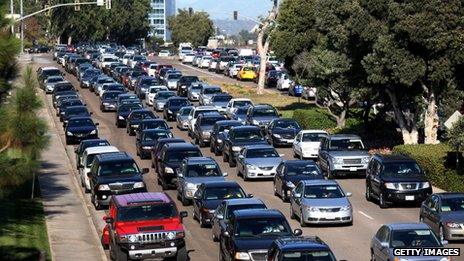Autism: Traffic pollution linked, study suggests
- Published

Heavy traffic in San Diego, California
The possibility that autism is linked to traffic pollution has been raised by researchers in California.
Their study of more than 500 children said those exposed to high levels of pollution were three times more likely to have autism than children who grew up with cleaner air.
However, other researchers said traffic was a "very unlikely" and unconvincing explanation for autism.
The findings were presented in the Archives of General Psychiatry journal.
Data from the US Environmental Protection Agency were used to work out levels of pollution for addresses in California.
This was used to compare exposure to pollution, in the womb and during the first year of life, in 279 children with autism and 245 without.
The researchers from the University of Southern California said children in homes exposed to the most pollution "were three times as likely to have autism compared with children residing in homes with the lowest levels of exposure".
They have previously shown a link between autism and living close to major roads.
They warn that there could be "large" implications because air pollution is "common and may have lasting neurological effects".
But how?
However, other researchers questioned how pollution could alter the brain's development and lead to autism.
Uta Frith, a professor of cognitive development at University College London, said: "It seems to me very unlikely that the association is causal."
She said the study did not "get us any further since it does not present a convincing mechanism by which pollutants could affect the developing brain to result in autism".
One of the challenges with this style of study is that it is difficult to account for every aspect of life which might affect the probability of developing autism, such as family history.
It means the study cannot say that autism is caused by traffic pollution, merely that there could be a link between the two.
Sophia Xiang Sun, from the University of Cambridge's autism research centre, argued that cutting pollution would be a good idea anyway.
"We know that traffic-related air pollution can contribute to many other diseases and conditions, and it is biologically plausible it also has a role in pathways of autism.
"However, whether or not the potential association between autism and traffic-related air pollution exists, reduction of traffic-related air pollution would be good for public health."
- Published27 January 2012
- Published25 April 2012